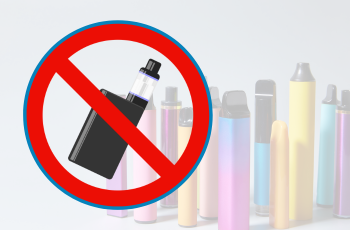In June 2025, the UK government plans to implement a ban on disposable vapes, aiming to reduce both environmental harm and the growing use of vaping products among young people. This move is a response to the rising popularity of single-use vapes, which are often seen as the product of choice for many, particularly among 11-15-year-olds.
In this article, we’ll explore the ban’s potential impact on wholesalers and retailers and provide strategies for adapting to this significant change in the vaping industry.
Understanding the 2025 UK Disposable Vape Ban
The UK government’s decision to ban disposable vapes is driven by the need to tackle two major concerns: the environmental impact of single-use products and the increasing use of vapes by young people. Reports show that 11-15-year-olds make up a significant portion of the vaping population, with many of them choosing disposable vapes as their preferred option. Studies reveal that millions of single-use vapes are sold yearly, many of which are thrown away in general waste, contributing to growing concerns over waste and pollution.
Andrew Gwynne, the Minister for Public Health and Prevention, has pointed out that disposable vapes are particularly harmful because of their packaging and the way they are discarded, posing a threat to the environment and public health. Importantly, the ban will not only protect the environment but also aim to reduce the appeal of vaping to vulnerable young people, who are often unaware of the potential dangers of using these products.
Potential Impact on Wholesalers and Retailers
The 2025 ban on disposable vapes will present challenges and opportunities for wholesalers and retailers. Due to their convenience, ease of use, and variety of flavours, disposable vapes have become a product of choice for many consumers. These products have seen substantial sales growth in the past few years. For wholesalers, this means the ban may impact a significant portion of their inventory.
Retailers relying on disposable vapes as a key part of their sales must adapt quickly. They will have to shift their focus to other types of vaping products not subject to the ban. These include refillable vapes, e-liquids, and pod systems, likely increasing demand as disposable vapes are phased out. Adapting product offerings early on will help businesses avoid potential revenue losses and stay competitive in the changing market.
Strategies for Wholesalers and Retailers to Adapt
To transform the upcoming ban and continue to grow, wholesalers and retailers should consider several strategies:
-
Diversify Your Product Range: As disposable vapes become less available, refillable vapes, e-liquids, and pod systems will become the product of choice for many customers. Wholesalers and retailers should focus on these alternatives, which offer longer-lasting options that are more sustainable and aligned with public health objectives.
-
Educate Consumers: One of the biggest challenges wholesalers and retailers will face is shifting consumer behavior. Many customers may not be aware of the environmental impact of disposable vapes or their potential risks, especially for vulnerable young people. Retailers should educate consumers about the benefits of reusable vaping devices and the long-term cost savings.
-
Sustainability Focus: In light of the growing environmental concerns around disposable vapes, businesses should start incorporating more eco-friendly products into their inventory. Products made from recyclable or biodegradable materials will appeal to environmentally-conscious customers, especially as banning disposable vapes aims to protect the environment.
Navigating Compliance and Regulatory Challenges
As the ban approaches, wholesalers and retailers must also ensure they comply with existing and upcoming regulations related to vaping products. The UK government will likely introduce stricter guidelines for the marketing, selling, and labelling of CBD products, including vapes, especially after the ban on disposables takes effect.
For businesses that sell CBD products, including vapes, staying up-to-date on CBD regulation and ensuring all products are compliant will be essential. Clear, honest, and compliant product labels will be crucial in avoiding legal issues related to Food and Drug Administration (FDA) guidelines. Businesses should ensure their products meet the standards set out in local laws so they can continue operating without interruption.
At JM Wholesale, we offer various alternative vaping solutions and CBD products to help wholesalers and retailers adapt to the changing world. Staying informed and ahead of the curve will allow businesses to thrive in this evolving industry.
Conclusion
The 2025 UK disposable vape ban is a significant change that will impact wholesalers, retailers, and consumers alike. However, with proper preparation, businesses can navigate these changes and continue to succeed in the market. By diversifying product offerings, focusing on education, and staying compliant with new regulations, wholesalers and retailers can position themselves for long-term success in the post-disposable vape era.
For more information on sustainable alternatives and product offerings, visit JM Wholesale.
